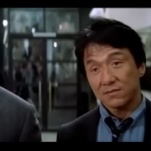The X-Files: “Tithonus” / Millennium: “Borrowed Time”

“Tithonus” (season 6, episode 10; originally aired 1/24/1999)
In which Scully doesn’t die.
There’s a moment roughly halfway through “Tithonus” that sums up everything I love about Dana Scully. Director Kersh has teamed Scully up with Ritter, an ambitious agent out in New York who thinks he’s stumbled across a long-hidden serial killer. His suspect, Arthur Fellig (Geoffrey Lewis), has taken a lot of pictures of dead people, but that’s to be expected; Fellig is a licensed crime scene photographer, and snapping shots of corpses comes with the territory. Some of those pictures don’t quite add up, though, like a clock that tells a time forty-five minutes before anyone called the cops. So Ritter decided to investigate, and Scully, sans Mulder, is along for the ride. Ritter isn’t a very good agent, though, and they hit a wall in the case, which leads to a stake-out in front of Fellig’s apartment building. When it’s Scully’s turn on the clock, instead of spending her night staring out the windshield and drinking endless cups of coffee, she goes into the building and confronts Fellig directly.
That’s the moment right there: the choice to go off book and just cut to the chase because why the hell not. Scully gets a lot of credit for being the more grounded of the show’s two leads (there are hot air balloons more grounded than Mulder), but she’s also no-nonsense, and once she realizes that whatever is going on is a lot weirder than Ritter will ever admit to, she takes the next logical step and asks Fellig what the hell his deal is. It galvanizes the story in an unexpected way, changing the relationship between the protagonist and the latest monster of the week into something more intimate and dangerous than the usual cops-and-robbers routine. If I hadn’t seen this episode before, I would’ve assumed that eventually, Scully would follow Fellig and catch him in the act of taking one of his photographs; instead, she meets him head on, and he invites her along for the ride. Fellig isn’t a monster, at least not in the usual sense, and while he is on the run, it’s in the opposite direction you’d expect. He’s not trying to escape anyone. He’s trying to catch Death.
At times, Vince Gilligan’s script plays like a secret homage to “Clyde Bruckman’s Final Repose,” one of The X-Files' greatest hours. Once again, we’re faced with a man who knows too much about death for his own good, but where poor Clyde was tormented by an unshakable understanding of the machinations of fate, Arthur doesn’t know how his subjects will die, just when. In the unsettling cold open, the photographer stalks a pretty young woman as she delivers mail in an office building. She gets on an elevator, he joins her, but before they can get to the next stop, Fellig sees in the reflection of the elevator doors that everyone else in the car but him has gone monochromatic. He quickly exists the elevator, and then races down stairs as the elevator cables snap, plunging everyone left inside to their doom. It’s a great sequence because it establishes Fellig as a creepy guy, but it doesn’t give you the satisfaction of watching him sink fangs into a victim, or scuttle on the ceiling, or turn into a wolf. That elevator was going to fall no matter what he did. He’s just the guy taking photos of the bodies while they’re still warm, for reasons we don’t yet understand.
For all his weary cynicism, Clyde Bruckman still had his soul; Fellig’s seems to have been lost somewhere in the past. “Final Repose” leavened its grim fatality with dark wit, but “Tithonis” is rarely funny. While it doesn’t play out like a classic monster episode, it feels like one, and even when you realize just what kind of man Fellig is (and that he really hasn’t been killing people), nothing ever feels safe. That’s partly due to Geoffrey Lewis’s low-key performance. Lewis’s hang-dog expression is one of his great assets as a character actor, and on Arthur Fellig, it’s the face of a man who doesn’t give a shit about anything. Bruckman’s tragedy was that deep down inside, he still cared, which meant he still felt every death he foresaw. Fellig is a ghoul, ground down by the decades until all that drives him is a single, burning need. It’s not just that he’s tired of living; he’s resentful of the people he photographs, jealous of them for having access to the only secret still left. I’ve seen and read other stories with character ground down by the tedium of immortality, but this episode isn’t about the unseen costs of eternal life. True, Fellig’s long life hasn’t done him any favors, but the impression I got from his monologues, from his exhaustion, from his complete disinterest in trying to help anyone he sees, that he was never much of a man to begin with. Bruckman talked about trying to prevent what he foresaw and failing, because he was trapped by fate; Fellig wants people to die, and even though Scully is unable to prevent the one death she witnesses with him, that doesn’t mean all the deaths he sees are inevitable. Or maybe it does, given how many times Fellig has tried and failed to kill himself over the years. He’s obsessed with looking Death in the face, because he saw Death once before, a century ago when he was struck by the yellow fever. He turned away when Death came for him, and it took the nurse by his side instead, and he’s been doomed to wander the earth ever since. Maybe death can’t be forestalled, merely exchanged. That still doesn’t make Fellig any easier to pity. In fact, one the episode’s subtler points is how it suggests that Fellig’s immortality, his exclusion from one of the two things that must happen to every living thing, has made him something less than a man. He’s a monster not for what he does, but for what he is.
In my review for “The Rain King,” I said I wished the show would go back to being scary, and “Tithonus” does the job well. What makes it especially powerful is that the scares are never obvious or telegraphed. I called Fellig the monster of the week, because it’s his powers and decisions which drive the story, but you might as well say Death himself is the one lurking in every shadow. And it’s not the loopy, slapstick loving Death of the Final Destination movies, either. This Death is a nasty, brutal bastard, and all of the fatalities in the episode are realistic (comparatively) enough to be creepy in a different way than death at the claws of some slavering beast. Scully isn’t trying to track down a threat which can be neutralized or defeated. Fellig is dead by the end of the hour, but even if he’d died ages ago, the people in the elevator would still be goners, just like the mugging victim and the hooker who gets hit by a truck. And people will still die tomorrow and the day after that, and the day after that. Fellig just happened to get a glimpse of the underside of everything, and, like a protagonist in a Lovecraft story, what makes him awful is the knowledge he brought back.
Yet this isn’t an entirely despairing episode. (We’re not watching Millennium, after all.) That brings me back to Scully, who, as with “Clyde Bruckman’s Final Repose” is the heart of the story. Her efforts to understand Fellig, and to grasp the implications of what he tells her, belie the criticism that her character’s skepticism was static. Yes, there are episodes in which she’s written as nothing more than a doubt delivery system, a wall for Mulder to bounce his theories off of so that they come back sounding slightly more reasonable. But the show’s best writers realized that Scully’s philosophy is less about unbelief than it is about stability. She grounds the show, a sane observer in a reliably insane world, and her struggle to reconcile her faith in God and the essential practicality of life with Mulder’s lawless visions is one of The X-Files most powerful dramatic arcs. It’s not always handled well, but Gilligan knows the characters and he knows what he’s doing, and Scully is at her best here, curious, relentless, and dismayed all at once. She goes into the case with her eyes open, and when the details don’t add up, she starts asking questions, much to the dismay of Agent Ritter. When she doubts Fellig’s story, it’s sanity speaking, not obduracy, and she’s smart enough to catch on when something goes wrong. Not that she can do much about it.
The centerpiece of the episode comes in Scully’s conversations with Fellig, once he’s told her his secret. While the sixth season is probably late in the game for a series’ star to have a defining moment, Scully’s baffled response to Fellig’s despair comes off as one. She doesn’t understand his misery, his listlessness, his barely veiled contempt. “I think you’re wrong. How can you have too much life? There’s too much to learn, too much to experience.” It’s simply stated, but it tells you everything you need to know—for all the horrors she’s had to endure, Scully remains an optimist. She still believes in life. Which is why it’s so horrifying when we see through Fellig’s eyes that she’s turned to black-and-white; by the story’s logic, she’s doomed. The climax of “Tithonus” is a fine example of misleading suspense. When Fellig sees Scully’s changed color, he pickpockets her cell phone, and he instantly becomes ten degrees creepier. Mulder finds out that Fellig (under a different name) killed two patients at a hospital in his hunt to find Death, and that goes even further towards guiding us down the wrong path: Fellig is going to murder Scully before he disappears again. Only, that’s not what happens. Already on edge (and willing to bribe a witness and let a murderer go free in order to catch his man), Ritter arrives at Fellig’s apartment and opens fire as soon as he sees the photographer, not realizing that Scully is standing behind the other man. The bullet goes through the lens of Fellig’s camera, through his body, and into Scully’s stomach.
So Fellig wasn’t the threat, beyond his usual peeping tom act. But as Scully bleeds out on the floor, he reachs for her hand and tells her to look away—she can see Death now, but she looks away from it the way he did so many years ago, she’ll be safe. She does, and Fellig finally embraces his fate. He was never a threat, just the messenger, and in his selfishness, he gets to do one last nice thing for the world: he makes Dana Scully immortal. One of the reasons I mentioned the Bruckman episode is the great scene in it when Scully asks Clyde how she’ll die, and he tells her, “You don’t.” It was a lovely exchange, a chance for a man pummeled by things he couldn’t unsee (and it’s fascinating that Bruckman got his “gift” by looking too much, while Fellig was cursed for turning away) to lie a little, but “Tinthonus” makes it real. That’s a bold choice, and if this wasn’t Scully, it would probably be too much; as is, I doubt it gets referenced again on the series, and I also doubt it’s treated as canon. Besides, going by Mulder’s last line (“I think Death only looks for you once you seek its opposite.”), Scully is probably just as mortal as the rest of us; after all, she’s still reaching for life. But I’d rather believe she’ll go on forever.







































